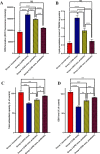The ameliorating effect of limosilactobacillus fermentum and its supernatant postbiotic on cisplatin-induced chronic kidney disease in an animal model
- PMID: 37461012
- PMCID: PMC10351115
- DOI: 10.1186/s12906-023-04068-8
The ameliorating effect of limosilactobacillus fermentum and its supernatant postbiotic on cisplatin-induced chronic kidney disease in an animal model
Abstract
Background: Chronic kidney disease (CKD) is a worldwide public health problem affecting millions of people. Probiotics and postbiotics are associated with valuable compounds with antibacterial, anti-inflammatory, and immunomodulatory effects, preserving renal function in CKD patients. The current study is aimed to evaluate the efficacy of Limosilactobacillus fermentum (L. fermentum) and its postbiotic in an animal model of cisplatin-induced CKD.
Methods: The animals were divided into four experimental groups (normal mice, CKD mice with no treatment, CKD mice with probiotic treatment, and CKD mice with postbiotic treatment). CKD mice were induced by a single dose of cisplatin 10 mg/kg, intraperitoneally. For 28 days, the cultured probiotic bacteria and its supernatant (postbiotic) were delivered freshly to the related groups through their daily water. Then, blood urea nitrogen (BUN) and creatinine (Cr) of plasma samples as well as glutathione (GSH), lipid peroxidation, reactive oxygen species, and total antioxidant capacity of kidneys were assessed in the experimental mice groups. In addition, histopathological studies were performed on the kidneys.
Results: Application of L. fermentum probiotic, and especially postbiotics, significantly decreased BUN and Cr (P < 0.0001) as well as ROS formation and lipid peroxidation levels (P < 0.0001) along with increased total antioxidant capacity and GSH levels (P < 0.001). The histopathologic images also confirmed their renal protection effect. Interestingly, the postbiotic displayed more effectiveness than the probiotic in some assays. The improvement effect on renal function in the current model is mainly mediated by oxidative stress markers in the renal tissue.
Conclusions: In conclusion, it was found that the administration of L. fermentum probiotic, and particularly its postbiotic in cisplatin-induced CKD mice, showed promising effects and could successfully improve renal function in the animal model of CKD. Therefore, probiotics and postbiotics are considered as probably promising alternative supplements to be used for CKD.
Keywords: CKD mice model; In-vivo study; Integrative medicine; Limosilactobacillus fermentum; Postbiotic; Probiotic; Renoprotection.
© 2023. The Author(s).
Conflict of interest statement
The authors declare that they have no conflicts of interest.
Figures



Similar articles
-
Dietary Probiotic Pediococcus acidilactici GKA4, Dead Probiotic GKA4, and Postbiotic GKA4 Improves Cisplatin-Induced AKI by Autophagy and Endoplasmic Reticulum Stress and Organic Ion Transporters.Nutrients. 2024 Oct 18;16(20):3532. doi: 10.3390/nu16203532. Nutrients. 2024. PMID: 39458526 Free PMC article.
-
Lactobacillus fermentum JX306 Restrain D-galactose-induced Oxidative Stress of Mice through its Antioxidant Activity.Pol J Microbiol. 2020 Sep;69(2):205-215. doi: 10.33073/pjm-2020-024. Epub 2020 Jun 4. Pol J Microbiol. 2020. PMID: 32548989 Free PMC article.
-
Probiotic and postbiotic interference exhibit anti-adhesion effects against clinical methicillin-resistant Staphylococcus aureus (MRSA) and impede MRSA-induced intestinal epithelial hyper-permeability in HT-29 cell line.Microb Pathog. 2025 Feb;199:107215. doi: 10.1016/j.micpath.2024.107215. Epub 2024 Dec 6. Microb Pathog. 2025. PMID: 39647539
-
Limosilactobacillus fermentum CECT5716: Clinical Potential of a Probiotic Strain Isolated from Human Milk.Nutrients. 2023 May 6;15(9):2207. doi: 10.3390/nu15092207. Nutrients. 2023. PMID: 37432320 Free PMC article. Review.
-
Limosilactobacillus fermentum, Current Evidence on the Antioxidant Properties and Opportunities to be Exploited as a Probiotic Microorganism.Probiotics Antimicrob Proteins. 2022 Oct;14(5):960-979. doi: 10.1007/s12602-022-09943-3. Epub 2022 Apr 25. Probiotics Antimicrob Proteins. 2022. PMID: 35467236 Review.
Cited by
-
Postbiotics in the Bakery Products: Applications and Nutritional Values.Probiotics Antimicrob Proteins. 2025 Feb;17(1):292-314. doi: 10.1007/s12602-024-10327-y. Epub 2024 Jul 27. Probiotics Antimicrob Proteins. 2025. PMID: 39066881 Review.
-
Limosilactobacillus fermentum Strains as Novel Probiotic Candidates to Promote Host Health Benefits and Development of Biotherapeutics: A Comprehensive Review.Probiotics Antimicrob Proteins. 2024 Aug;16(4):1483-1498. doi: 10.1007/s12602-024-10235-1. Epub 2024 Feb 23. Probiotics Antimicrob Proteins. 2024. PMID: 38393628 Review.
-
Characteristics of tongue coating microbiota in diabetic and non-diabetic kidney patients receiving hemodialysis.BMC Oral Health. 2025 Jan 20;25(1):104. doi: 10.1186/s12903-025-05455-y. BMC Oral Health. 2025. PMID: 39833942 Free PMC article.
-
Trinitroglycerine-loaded chitosan nanoparticles attenuate renal ischemia-reperfusion injury by modulating oxidative stress.Sci Rep. 2024 Dec 30;14(1):32112. doi: 10.1038/s41598-024-83886-3. Sci Rep. 2024. PMID: 39738455 Free PMC article.
-
Gut Dysbiosis and Probiotic Therapy in Chronic Kidney Disease: A Comprehensive Review.Probiotics Antimicrob Proteins. 2024 Dec 13. doi: 10.1007/s12602-024-10427-9. Online ahead of print. Probiotics Antimicrob Proteins. 2024. PMID: 39668321 Review.
References
-
- Zheng HJ, Guo J, Wang Q, Wang L, Wang Y, Zhang F, et al. Probiotics, prebiotics, and synbiotics for the improvement of metabolic profiles in patients with chronic kidney disease: a systematic review and meta-analysis of randomized controlled trials. Crit Rev Food Sci Nutr. 2021;61(4):577–98. doi: 10.1080/10408398.2020.1740645. - DOI - PubMed
-
- Webster AC, Nagler EV, Morton RL, Masson P. Chronic Kidney Disease The Lancet. 2017;389(10075):1238–52. - PubMed
MeSH terms
Substances
Grants and funding
LinkOut - more resources
Full Text Sources
Other Literature Sources
Medical

